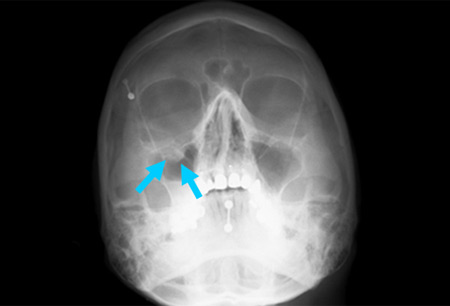Resumo
Definição
História e exame físico
Principais fatores diagnósticos
- diplopia ao olhar para cima
- alteração da posição do globo
- distância intercantal aumentada
- sintomas oculovagais (bradicardia, hipotensão, náuseas/vômitos)
Outros fatores diagnósticos
- distúrbio visual
- equimose periorbital
- edema periorbital
- perda da sensibilidade do nervo
- hemorragia subconjuntival
- defeito de alinhamento da borda infraorbital
- perda da visão das cores
- reflexo pupilar à luz alterado
- acuidade visual reduzida
Fatores de risco
- trauma direto
- adultos jovens e crianças
- idosos em risco de quedas
- sexo masculino
Investigações diagnósticas
Primeiras investigações a serem solicitadas
- radiografia da face
- tomografia computadorizada (TC) da órbita
Investigações a serem consideradas
- ressonância nuclear magnética (RNM) da órbita
- teste de ducção forçada
- teste ortóptico
Novos exames
- exame ultrassonográfico orbital
Algoritmo de tratamento
morbidade ocular urgente
sem morbidade ocular urgente
Colaboradores
Autores
Alistair R.M. Cobb, MBBS, BDS, FRCS (OMFS), FDSRCS (Eng), MFSEM (UK)
Consultant Oral and Maxillofacial Surgeon
South West Cleft Service
United Hospitals Bristol NHS Trust
Bristol
UK
Declarações
ARMC is an author of a number of references cited in this topic.
Agradecimentos
Mr Alistair Cobb would like to gratefully acknowledge Mr Timothy Lloyd, a previous contributor to this topic.
Declarações
TL declares that he has no competing interests.
Revisores
Andrew Parfitt, MBBS, FFAEM
Clinical Director
Acute Medicine
Associate Medical Director
Consultant Emergency Medicine
Guy's and St Thomas' NHS Foundation Trust
Clinical Lead and Consultant
Accident Emergency Medicine
St Thomas' Hospital
London
UK
Declarações
AP declares that he has no competing interests.
Mark I. Neuman, MD
Assistant Professor of Pediatrics
Children's Hospital Boston
Harvard Medical School
Boston
MA
Declarações
MIN declares that he has no competing interests.
Créditos aos pareceristas
Os tópicos do BMJ Best Practice são constantemente atualizados, seguindo os desenvolvimentos das evidências e das diretrizes. Os pareceristas aqui listados revisaram o conteúdo pelo menos uma vez durante a história do tópico.
Declarações
As afiliações e declarações dos pareceristas referem--se ao momento da revisão.
Referências
Principais artigos
Manolidis S, Weeks BH, Kirby M, et al. Classification and surgical management of orbital fractures: experience with 111 orbital reconstructions. J Craniofac Surg. 2002 Nov;13(6):726-37. Resumo
Cobb A, Murthy R, Manisali M, et al. Oculovagal reflex in paediatric orbital floor fractures mimicking head injury. Emerg Med J. 2009 May;26(5):351-3.Texto completo Resumo
Artigos de referência
Uma lista completa das fontes referenciadas neste tópico está disponível para os usuários com acesso total ao BMJ Best Practice.

Diagnósticos diferenciais
- apenas trauma dos tecidos moles
Mais Diagnósticos diferenciaisConectar-se ou assinar para acessar todo o BMJ Best Practice
O uso deste conteúdo está sujeito ao nosso aviso legal